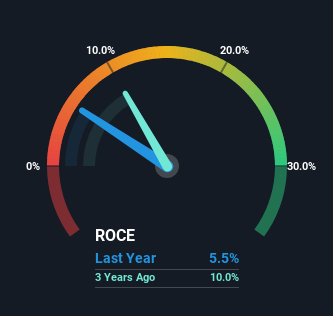- Taiwan
- /
- Tech Hardware
- /
- TWSE:4938
Slowing Rates Of Return At Pegatron (TWSE:4938) Leave Little Room For Excitement

Finding a business that has the potential to grow substantially is not easy, but it is possible if we look at a few key financial metrics. Typically, we'll want to notice a trend of growing return on capital employed (ROCE) and alongside that, an expanding base of capital employed. This shows us that it's a compounding machine, able to continually reinvest its earnings back into the business and generate higher returns. However, after investigating Pegatron (TWSE:4938), we don't think it's current trends fit the mold of a multi-bagger.
Understanding Return On Capital Employed (ROCE)
For those who don't know, ROCE is a measure of a company's yearly pre-tax profit (its return), relative to the capital employed in the business. The formula for this calculation on Pegatron is:
Return on Capital Employed = Earnings Before Interest and Tax (EBIT) ÷ (Total Assets - Current Liabilities)
0.055 = NT$15b ÷ (NT$520b - NT$247b) (Based on the trailing twelve months to March 2024).
Thus, Pegatron has an ROCE of 5.5%. Ultimately, that's a low return and it under-performs the Tech industry average of 11%.
Check out our latest analysis for Pegatron

In the above chart we have measured Pegatron's prior ROCE against its prior performance, but the future is arguably more important. If you'd like, you can check out the forecasts from the analysts covering Pegatron for free.
So How Is Pegatron's ROCE Trending?
In terms of Pegatron's historical ROCE trend, it doesn't exactly demand attention. Over the past five years, ROCE has remained relatively flat at around 5.5% and the business has deployed 25% more capital into its operations. Given the company has increased the amount of capital employed, it appears the investments that have been made simply don't provide a high return on capital.
On a side note, Pegatron has done well to reduce current liabilities to 48% of total assets over the last five years. This can eliminate some of the risks inherent in the operations because the business has less outstanding obligations to their suppliers and or short-term creditors than they did previously. Although because current liabilities are still 48%, some of that risk is still prevalent.
The Key Takeaway
In conclusion, Pegatron has been investing more capital into the business, but returns on that capital haven't increased. Yet to long term shareholders the stock has gifted them an incredible 197% return in the last five years, so the market appears to be rosy about its future. But if the trajectory of these underlying trends continue, we think the likelihood of it being a multi-bagger from here isn't high.
On a final note, we've found 1 warning sign for Pegatron that we think you should be aware of.
While Pegatron isn't earning the highest return, check out this free list of companies that are earning high returns on equity with solid balance sheets.
New: Manage All Your Stock Portfolios in One Place
We've created the ultimate portfolio companion for stock investors, and it's free.
• Connect an unlimited number of Portfolios and see your total in one currency
• Be alerted to new Warning Signs or Risks via email or mobile
• Track the Fair Value of your stocks
Have feedback on this article? Concerned about the content? Get in touch with us directly. Alternatively, email editorial-team (at) simplywallst.com.
This article by Simply Wall St is general in nature. We provide commentary based on historical data and analyst forecasts only using an unbiased methodology and our articles are not intended to be financial advice. It does not constitute a recommendation to buy or sell any stock, and does not take account of your objectives, or your financial situation. We aim to bring you long-term focused analysis driven by fundamental data. Note that our analysis may not factor in the latest price-sensitive company announcements or qualitative material. Simply Wall St has no position in any stocks mentioned.
About TWSE:4938
Pegatron
Engages in designing, manufacturing, and selling computer, communication, and consumer electronic products internationally.
Flawless balance sheet established dividend payer.
Similar Companies
Market Insights
Community Narratives



